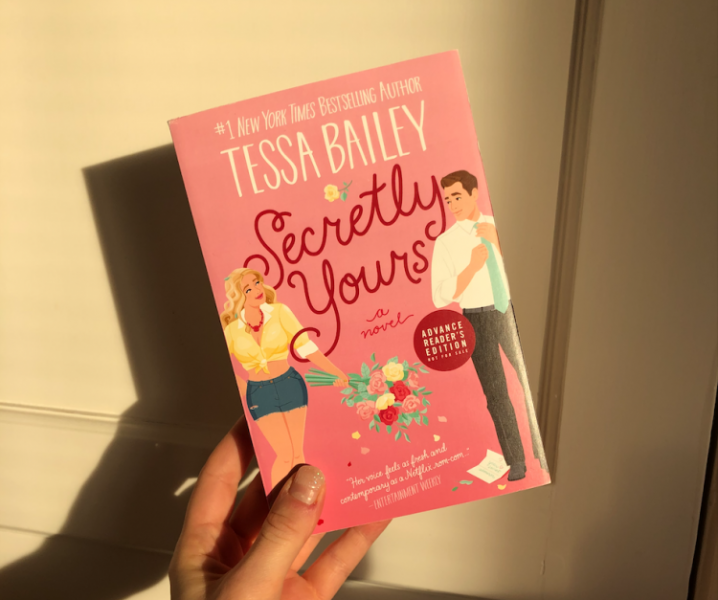Book review: Secretly Yours by Tessa Bailey

Arts and Lit editor, Ella Minty, reviews the booktok sensation, Secretly Yours by Tessa Bailey
Tik-Tok sensation Tessa Bailey’s new novel, Secretly Yours, advertises itself as ‘a steamy new rom-com about a starchy professor and the bubbly neighbor he clashes with at every turn’. Exepose were sent an advance reader copy, and it didn’t disappoint. Steamy, comedic and also profoundly insightful, Bailey tells the story of Hallie Welch, the chaotic twenty-nine-year-old gardener struggling with the passing of her grandmother, and Julian Vos, a history professor at Harvard who loves routine and structure. After nearly kissing in the vineyards of his family’s winery in Napa when Hallie was fourteen, she is determined to put the whole situation behind her once and for all. Employed as a gardener on his family’s estate, though, their paths inevitably cross.
This novel was a mixed bag for me; I enjoyed the light-heartedness of the romance, which at times confronted more serious themes like Hallie’s grief after the passing of her grandmother. What I particularly enjoyed was the presentation of Julian’s battle with anxiety, as male mental health is rarely confronted in fiction. Especially in romance fiction, the depiction of the male protagonist is often that he’s the strong saviour of the woman he’s trying to woo. This stereotype definitely gets exploited by Bailey, but there is also more depth to Julian than the typical male main character as he struggles with his mental health alongside the more light-hearted sections of the novel.
What I particularly enjoyed was the presentation of Julian’s battle with anxiety, as male mental health is rarely confronted in fiction.
Despite this, there were problematic sections for me. The most prevalent of the problems with the novel was the representation of female virginity; during the sex scenes in the novel (of which there’s plenty), Hallie is sometimes empowered and confident, yet Julian’s perspective on the action is slightly worrying. He views Hallie’s virginity as obvious through their sexual escapades, calling her “his” because she hadn’t been with anyone else previously. Hallie’s exuberant confidence is diminished during these kinds of scenes, which are mostly from Julian’s perspective; he calls her a “little thing” and describes her as “tiny” beneath him. It is highly unlikely that he could tell she was a virgin through their sexual experimentation; this kind of representation of female virginity could be damaging to younger female readers of the novel, where female virginity is seen as a simultaneously more pleasurable experience for the man and a way for men to overpower women. The book adheres to problematic representations of female virginity seen in period romances, such as the Bridgerton books, for example, where regency women have no clue until their wedding night what sex is, whereas their male counterparts are sexually experienced because of the sexual double standard.
My second problem with this novel, a common problem for romance novels, is that it is slightly too cheesy sometimes, and everything falls into place too easily for real life. A prime example of this is: “Indeed, with his very serious eyebrows and jawline, he resembled a gallant duke come to rescue a damsel in distress. Well, call her Princess Peach Toadstool, because she welcomed her services”. At times, the switch of serious professor Vos to dirty-talker Julian is hard to believe. Hallie and Julian’s sister Natalie get along like best friends, and the setting of Napa in Spain only adds to this fairy-tale feeling of everything falling too easily in place.
Additionally, the plot of the secret admirer letters Hallie leaves Julian adds nothing to the story, although it is heavily alluded to in the blurb of the novel. Creating an unnecessary conflict and becoming a side plot, it felt unrealistic and forced. I enjoyed the organic interaction between Hallie and Julian much more than their epistolary correspondence, which didn’t really add anything to the plot.
The plot of the secret admirer letters Hallie leaves Julian adds nothing to the story, although it is heavily alluded to in the blurb of the novel.
Although there were problematic flaws in this novel, it is definitely worth a read if you fancy a beach-read of a summer romance. The characters were enjoyable to read about, and I felt compelled to finish the novel and see what the fates of the two main characters were. Perfect for a summer read, it was a nice contrast to the nineteenth-century novels I am currently reading for module work!


